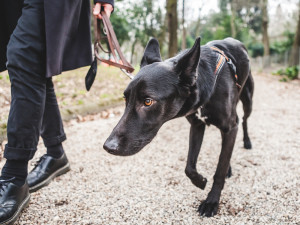What is ‘Werewolf Syndrome’ and Should I Be Worried?
Pet parents have been urged to exercise caution as dog chews sold in several countries across the EU are being recalled following reports of unusual behavioural changes. The changes – referred to as ‘werewolf syndrome’ – manifest as sudden aggression, hyperactivity, howling and other erratic behaviours not typical to the pups affected. While cases appear to be rare, the news has understandably left many pet parents around the world feeling anxious.
The Food Standards Agency (FSA)opens in new tab in the UK (where it is not believed the chews have been sold) has issued precautionary advice to pet parents in case they have managed to get hold of the chews. Similar warnings have been echoed by authorities in the Netherlandsopens in new tab, Denmarkopens in new tab and Germanyopens in new tab where the products were on sale. The Food and Drug Administration (FDA) in the US is monitoring the situation but, speaking to eFoodAlertopens in new tab, they said that the Center for Veterinary Medicineopens in new tab has not received any reports or consumer complaints of werewolf syndrome in the United States associated with dog chews.
Affected items include specific batches of Barkoo and Chrisco chew bones, sold widely across Europe. Although the suspected batches haven’t been confirmed as sold in the UK or US, the FSA in the UK believe there is a small chance that pet parents could have bought affected items online.
“While there is no confirmed distribution of affected products to the UK, there is the possibility that some consumers may have purchased these online from international sellers,” explains Tina Potter, head of incidents at the FSA. “No unsafe dog chews have been identified but, based on international investigations so far, we are advising dog owners to avoid feeding the affected chews to dogs as a precaution.”
While so-called werewolf syndrome might seem like something out of a horror film, cases still remain rare, and there isn’t any evidence that symptoms are zoonotic (transferrable from animals to humans). “There is no evidence to suggest these products present any risk to human health,” adds Tina.
That being said, the small number of stories coming out of Europe have got pet parents understandably worried. We unpack what werewolf syndrome is exactly, and whether you should be worried about your four-legged friends.
What is werewolf syndrome?
The term werewolf syndrome has gained traction online as shorthand for a cluster of symptoms reported in dogs who appear to have consumed certain chew products. While not an official medical diagnosis, the term groups together sudden neurological symptoms such as:
Sudden, unprovoked aggression or fearfulness.
Excessive barking, crying or howling.
Hyperactivity or restlessness.
Destructive tendencies, such as chewing furniture.
Physical symptoms such as epileptic-style seizures, vomiting, diarrhoea and lethargy have also been observed in some cases. Reports have primarily come from pet parents in mainland Europe, prompting further investigations in countries including Germany, Finland, Belgium, Switzerland and now also in the Netherlands.
Pet parents Manon Grave and her husband from Noordhorn, a small village in the north of the Netherlands told RTVNoordopens in new tab that their Staffordshire Bull Terrier, Jayden, had a seizure after eating a chewing bone made in Germany.
“She became completely hysterical,” Manon told the Dutch publicationopens in new tab. “She then had a kind of panic attack, and wanted to flee and tried to run away right through the window or door.”
“She started behaving like a wolf,” added Manon, “letting out wolf howls and screaming very loudly in between – I don't have another word for it.”
The couple ended up at a veterinary clinic in Roden where the vet asked if they had given the dog chew bones; he had had four other dogs with the same symptoms, of which he had had to put two down.
Which pet products are affected?
The primary focus of the recalls is on a selection of Barkoo and Chrisco chew bones, popular dog treats among pet parents in Europe. Although there is no confirmed distribution of the specific chews to the UK or the US, and no cases have been detected in the UK or US, pet parents could have had access to the treats via online retailers.
“Our understanding is that UK Government Departments are actively monitoring the issue and checks indicate that these products do not appear to be available to purchase in the UK; however, purchase in the UK via on-line sales may have been possible until recently.” The British Small Animal Veterinary Association (BSAVA) told Kinship. “The chews have a long shelf life and may have been bought several months ago.”
The FSA has issued a straightforward recommendation: stop giving any of these products to your pets and monitor them for any unusual behaviour. A full list of recalled items, including pictures of the chews, is available on the FSA websiteopens in new tab.
What causes werewolf syndrome
According to the Dutch Food and Consumer Product Safety Authorityopens in new tab (NVWA), contaminated batches are thought to contain harmful substances. Researchers currently suspect that chew bones, chew snacks and chew sticks may have been contaminated with mycotoxins (mould toxins)opens in new tab during the production process.
While no definitive contamination cause has been identified, early theories could also suggest the symptoms might be linked to chemical residue, bacterial toxins or allergens in the products. Experts have ruled out infections, vaccinations and tick remedies as the cause in affected dogs at the University Animal Hospital in Utrecht.
Should you be concerned about werewolf syndrome?
It’s natural to feel alarmed when the health of your four-legged family member is put into question – especially when terms like ‘werewolf syndrome’ are grabbing headlines. However, experts stress that cases appear to be exceptionally rare.
While the symptoms sound undoubtedly distressing, they have only been reported in a fraction of dogs that have consumed the chews in question. The FSA’s advice to UK pet parents is a precautionary measure.
“There is currently no confirmed distribution of these chews in the UK and no cases seen in the UK,” vet Dr Joey Corrick told Kinship, “but the Foods Standard Agency are advising dog owners not to feed the chews to their pets while they continue to investigate any safety concerns.
“Pet parents are advised to not feed the chews and contact their vets if they have fed their dogs these products and they are unwell,” adds Dr Corrick. “Vets have also been advised to report any suspected cases through the Animal and Plant Health Agency (APHA) Small Animal Surveillanceopens in new tab.”
Regulatory agencies in the UK (FSA) and in other European countries are actively investigating the issues, conducting laboratory tests on affected products to determine the root cause of the symptoms reported.
How to spot the symptoms of werewolf syndrome
Behavioural changes potentially linked to werewolf syndrome can be alarming, but they’re not always obvious, and could individually be linked to a different medical or behavioural condition. Some signs to look out for include:
Behavioural changes: sudden onset of aggression, excessive barking or howling, hyperactivity or crying.
Physical symptoms: epileptic-type seizures, vomiting, diarrhoea, loss of appetite and/or lethargy.
Personality changes: dogs becoming unusually fearful, timid or reactive.
”Possible signs in dogs include sudden behavioural changes such as howling, crying, aggression and epileptic-type seizures. Collectively these clinical signs have been described as ‘werewolf syndrome’.” The BSAVA told Kinship. “If owners notice these signs in their dog, they should contact their vet who can advise if the signs relate to the products in question or if there are other possible causes. Ceasing any feeding of these chews and obtaining veterinary treatment to address the signs, have in many cases in Mainland Europe proved successful.” Basically, if you’re concerned about a sudden onset of behaviour changes or physical symptoms, speak to your vet as soon as possible and provide them with details about your dog’s diet, including any treats and chews.
How can you treat werewolf syndrome?
As research on werewolf syndrome is limited, and cases are extremely rare, there are few known treatments for the neurological symptoms that appear. For physical symptoms, dogs who have been affected have been given diazepam for pain relief, but sadly, in Manon Grave’s case, some dogs have had to be put down.
“It went from bad to worse,” said Manon. “The attacks were coming more and more often. We went to the vet the next morning, but it was just not a tenable situation anymore. We had to put her to sleep. We had our backs against the wall.”
It didn’t stop there for Manon and her husband: when they returned home, their other dog had eaten half of an affected chew bone. Their vet told them to take their second dog straight to the University Animal Hospital in Utrecht as soon as possible, where she was fortunately able to make a full recovery.
“She was on a [saline] drip and she had medication,” said Manon. “The next day the attacks were significantly less. We then took her home because the attack was also triggered by excitement. We kept her as calm as possible for a few days and that helped.”
Fortunately, cases of werewolf syndrome appear to be extremely rare, and the ongoing investigations are a reassuring sign that regulators and manufacturers are taking the matter seriously.
Protecting pets from harm is at the heart of everything we do as dog parents, and ensuring the products we use are safe is a key part of that responsibility. If you have any concerns, speak to your vet or consult the FSA or the FDA for the latest updates.








